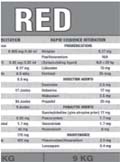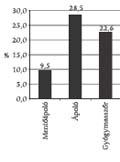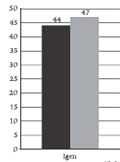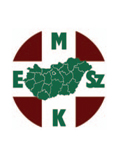The eLitMed.hu medical portal uses computer cookies for convenient operation. Detailed information can be found in the Cookie-policy.
Journal of Nursing Theory and Practice - 2012;25(02)
Content
[The specialities and competencies of nurse-level triage in paediatric emergency care ]
[A part of the emergency patient care system is paediatric emergency care, the organisation and management of which must take place in accordance with the same guiding principles and consensuses as adult emergency care. Owing to the special requirements stemming from the children’s age, anatomy and physiology, the assessment, categorisation, diagnostics, therapeutic interventions and implementation of the nursing process require special knowledge, skills and competencies in comparison to adult emergency care. The paper describes the process of patient admission and triage in intra-hospital paediatric emergency care in Hungary, with regard to the related nursing competencies. ]
[The situation of healthcare vocational training and nurse training at the Ferenczi Sándor Healthcare Vocational School, Miskolc]
[Aim of the study: The author aims to examine the opinions of healthcare vocational school students participating in the survey, with regard to further education and working abroad. The study also examines how attractive nursing training is to the students, and whether the student scholarship program has any effect on their choice of major. She attempts to assess the extent to which the place of nursing in the employment hierarchy, and the dimension of prestige, influence the value that society places on nursing. Methodology and sample: The descriptive, prospective research was conducted by means of a questionnaire-based survey of 12-year students prior to taking their general secondary school examinations (n=106), and year 14-15 students in vocational training (n=137), at Ferenczi Sándor Healthcare Vocational School, Miskolc. The data was collated using the SPSS program, and the processing of the results thus obtained took place using statistical mathematical (frequency, correlative coefficient) techniques. Results: Some 58% of the students about to sit their general secondary school examinations would enrol for nurse training at the school if they received a monthly scholarship grant. A total of 83% of the students in vocational training would like to find work that matches their acquired qualification, 63% would like to remain in education, while 35% would like to start work immediately after sitting the examination. More than 80% of the students are attracted by the opportunity to work abroad. In their opinion the social perception of nursing is lower than that of the other occupations. Conclusions: Due to the low prestige of the nursing profession and the low pay, students are not inclined to choose nurse training; however, the system of scholarship grants, as a motivational force, serves as a positive incentive to continue studying. The lack of financial rewards, however, prompts many of them consider migration.]
[The importance of patient education and ILCO clubs in the rehabilitation of stoma patients]
[Aim of the study: The author aims to reveal and propose a solution for the flaws in the education of stoma patients, especially with regard to patient education at the Department of Surgery in Szeged. She examined the opinions, attitudes and knowledge of stoma patients regarding patient information, rehabilitation, and the extent to which they participated in the self-help groups. Methodology and sample: In the course of the quantitative descriptive research a questionnaire-based survey was conducted among the stoma patients treated and cared for at the institute (N=96). The data was processed using mathematical statistical methods. Results: 83% of the patients received lifestyle information at the institute, which helped them to accept their illness, and 99% of them were taught about stoma care at the clinic. The patients that participated in the training course, with the assistance of the stomal therapy nurse, were better able to accept their disease. The proportion of those participating in the self-help group was 51%, despite the fact that 65% of those asked regarded the ILCO club as useful. Conclusions: The provision of lifestyle information and the development of patient education at the department have an important role, because the majority of the patients express no demand for club membership. The author also takes the opportunity to highlight the importance of a holistic and multidisciplinary approach to the nursing of stoma patients. ]
[Surgical isolation protocol and cost-effectiveness]
[A fundamental prerequisite for surgical procedure is full compliance with the rules on ensuring asepsis and antisepsis. The isolation and special clothing of the patient and surgical team has a long history. The doctors of our grandfathers’ generation donned white, and those of our fathers’ generation green clothing, while we now live in the age of the disposable isolation attire. The author aims was to demonstrate, through the work conducted at the central operating theatre of a county hospital, how a disposable isolation solution - used properly - is more cost-effective than a textile-based isolation system. The author introduces the professional guidelines for the use of a disposable isolation system, and the phases in its implementation and application. Through a cost analysis he proves that a properly used disposable isolation system represents a smaller financial burden for the given institution than the textile isolation systems used previously. Disposable isolation systems have lived up to expectations in day-to-day use, and there is demand for their use. ]
1.
Clinical Neuroscience
[Headache registry in Szeged: Experiences regarding to migraine patients]2.
Clinical Neuroscience
[The new target population of stroke awareness campaign: Kindergarten students ]3.
Clinical Neuroscience
Is there any difference in mortality rates of atrial fibrillation detected before or after ischemic stroke?4.
Clinical Neuroscience
Factors influencing the level of stigma in Parkinson’s disease in western Turkey5.
Clinical Neuroscience
[The effects of demographic and clinical factors on the severity of poststroke aphasia]1.
2.
Clinical Oncology
[Pancreatic cancer: ESMO Clinical Practice Guideline for diagnosis, treatment and follow-up]3.
Clinical Oncology
[Pharmacovigilance landscape – Lessons from the past and opportunities for future]4.
5.






